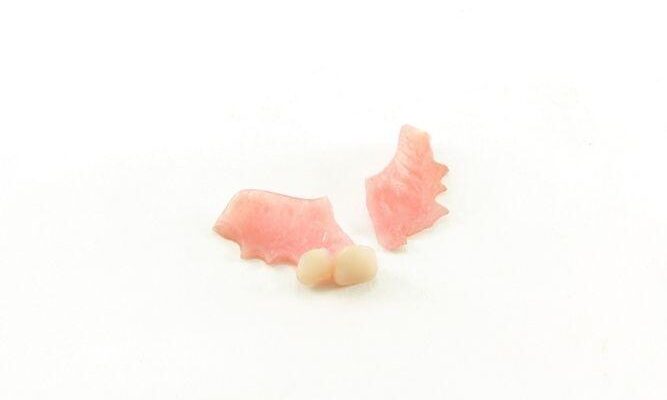At Borbely Swiss, we strive to make dentures accessible to everyone. That means we offer a wide variety of different types of dentures at several price points – we believe everyone deserves to eat, speak, and smile with confidence.
We know that dentures, even at their lowest price point, can be expensive. You never want to damage your dentures so badly that you need to replace them.
That’s why we’ve created this guide to the common causes of denture damage – and how to avoid them. By reading this, you’ll be able to prevent most damage to your dentures.
Forcing your dentures into place
If you’ve got suction dentures, this isn’t really a problem – though pressing too hard on your dentures could cause discomfort to your gums, it’s unlikely to damage your dentures themselves.
Snap-in dentures fitted over implants are a different story. The clasps on these dentures are supposed to fit over your implants with very little force – if they don’t, it’s likely they’re not in the right position or that they’ve warped in some way.
Forcing these clasps to fit onto the implants can cause them to warp, bend, or even break – and that will mean a trip to the denturist.
To avoid damaging your snap-in dentures, never force them into place, and never bite down on them or use tools to fit the clasps onto your implants. Slight pressure with your fingers should be all it takes to snap them in.
Denture slippage
When you’re first getting adjusted to suction dentures, you may find that they slip out of place. That’s because the muscles of your mouth aren’t used to holding them – as you become more experienced, holding your dentures in place will be second nature, and you won’t even have to think to do it.
While denture slippage doesn’t always cause damage, it can if your dentures fall out of your mouth. To prevent this, reposition your dentures when they slip by biting down on them and then swallowing. You can also use denture adhesive while you’re adjusting to wearing them. Be sure to visit our denture clinic in Winnipeg before opting for adhesive. Your dentures could be improperly fitted, and even if they are fitted properly, you don’t want to use adhesive too often, as it can cause health problems when overused.
Wear and tear
Everything wears down over time, and dentures are no exception. Eventually, your dentures will need to be repaired or replaced. Dentures go through a lot, after all – from extreme temperature changes when you eat ice cream while drinking coffee to taking the brunt of your bite force when you’re enjoying an apple.
Our meticulously crafted dentures can last over 10 years with proper care – though you may need to take advantage of our denture repair services to keep them in tip-top shape. You can limit wear and tear by following the care instructions your denturist gives you. Cleaning your dentures after every meal can seriously increase their lifespan.
Accidents
Accidents happen – and they’re one of the most common causes of damage to dentures. We’ve already explored dentures falling out because of denture slippage, but the most common accidents occur when dentures are being removed after eating or before sleeping.
Handle your dentures with caution. Consider removing them while sitting down to reduce the distance that they can fall if you drop them. When you’re cleaning your dentures, consider putting a soft towel or cloth below them to soften the blow if you drop them.
Improperly fitted dentures
One of the biggest causes of denture damage is improperly fitted dentures. That may come as a surprise – a bad fit might bother your gums, but why would it damage your dentures?
The answer is pretty interesting. When your dentures aren’t properly fitted, they can tend to bend toward the middle because of the space between them and your gums. Over time, these micro bends can add up, leading to a fracture and then a total split down the middle of your dentures.
That’s serious damage – and it’s not even accounting for how improperly fitted dentures can lead to irregular chewing, which can lead to chips and damage to the teeth themselves.
This problem is relatively easy to solve – if your dentures are uncomfortable, talk to your denturist to get them refitted or relined!
At-home repairs
There’s a place for at-home repairs in the world of dentures. When you can’t get professional repairs right away, at-home repair kits with dental-safe epoxy provide a temporary solution.
Temporary is the key word here – you need to get your denturist to conduct professional repairs. If you don’t, your temporary fix will eventually wear out. Worse yet, your temporary repairs can change the shape of your dentures, leading to some of the problems we described in the section above.
This is another easy problem to solve – always go to your denturist for repairs. We offer same-day emergency repairs at Borbely Swiss. Can’t make it in? Use an at-home denture repair kit with dental-safe epoxy – but make an appointment as soon as you can.
Avoiding denture damage is simple
All you’ve got to do is follow the steps we laid out above. And if your dentures are ever damaged, you can always call us for repairs. Routine dental repairs and relinings cost a lot less than replacements. If you see a chip or fracture, get it professionally repaired before it becomes a more serious problem!

